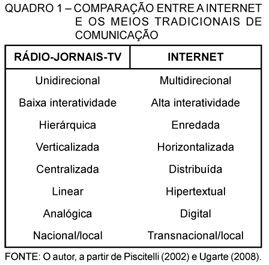This text proposes the existence of a basic divide in the relationship between politics and the Internet: the politics "of" the Internet and politics "on" the Internet. Topics of the politics of the internet are then divided into three fundamental fields of contention: network infrastructure; formats, patterns and applications and contents. It analyzes the most relevant current political topics within each field of conflict, articulating two aspects: the techno-social and the juridical-legislative. This article works with the concept of the architecture of power, an extension of Alexander Galloway's definition of protocol management and with Yochai Benkler's perspective on the existence of an interconnected public sphere. We conclude that freedom within cybernetic networks depends on the existence of non-identified navigation, that is, of anonymity. Pointed out as one of the major political disputes involving the Internet, the possibility of anonymity is presented as a fundamental element of resistance in the face of the ample possibilities that exist for control of social communication. Thus, to guarantee the freedom to produce content and have access to it through cybernetic networks (in which digital footprints accompany all navigation done by interacting citizens) demands support for non-identification.
Internet politics; architecture of power; cyberpolitics; network power

